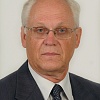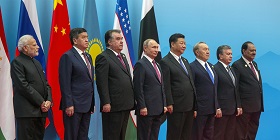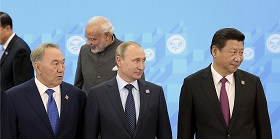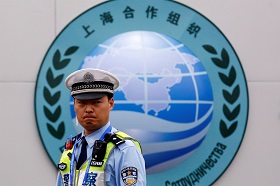Ensuring security and creating favorable conditions for the economic progress of states, regardless of their size and global political weight, is a long-term challenge for global development as a whole. This agenda gains greater relevance against the backdrop of increasingly turbulent global and regional processes that are characterized by both the exacerbation of old challenges and the expansion of new and non-traditional ones, the blurring (primarily at the initiative of the United States) of the basic principles of international law and inter-country relations, growing political egotism, protectionism in trade and economy, etc. Preventing these developments is becoming progressively more difficult without building up clear and substantive interaction between states that would not want these trends to become irreversible.
These circumstances were naturally the focus of the recent Bishkek summit of the Shanghai Cooperation Organisation (SCO), an alliance that has begun to stake its claim to being both a both trans-continental and global organization following the accession of India and Pakistan to its ranks. At the same time, while last year’s Shanghai 8 meeting in Qingdao, China was a sort of overture for its two new members, the Kyrgyzstan summit demonstrated the Organization’s rather quick (albeit not entirely smooth) adaptation to its qualitatively new geostrategic parameters.
The SCO is becoming increasingly confident in the path it is treading towards becoming the crucial foreign political hub of the broadly understood Eurasian space. The expanding multidimensional participation of its members in large-scale trans-regional economic projects and initiatives is laying a solid material basis for such prospects. Against this background, we can hardly expect the SCO to be able to boost the economic component of its activities and turn it into the core of its work. This place will most likely be held by the multidimensional security sector. The SCO states will become more involved in the Eurasian economic agenda through the transnational economic institutions they have already established (or are planning to establish). The Shanghai 8 will most likely play the role of a serious multidimensional political center. Both this area and the further bolstering of coordinated policies of SCO member states in the short and medium should be the focus of Russia’s year-long chairmanship of the SCO that it assumed on June 13–14.
Ensuring security and creating favorable conditions for the economic progress of states, regardless of their size and global political weight, is a long-term challenge for global development as a whole. This agenda gains greater relevance against the backdrop of increasingly turbulent global and regional processes that are characterized by both the exacerbation of old challenges and the expansion of new and non-traditional ones, the blurring (primarily at the initiative of the United States) of the basic principles of international law and inter-country relations, growing political egotism, protectionism in trade and economy, etc. Preventing these developments is becoming progressively more difficult without building up clear and substantive interaction between states that would not want these trends to become irreversible.
These circumstances were naturally the focus of the recent Bishkek summit of the Shanghai Cooperation Organisation (SCO), an alliance that has begun to stake its claim to being both a both trans-continental and global organization following the accession of India and Pakistan to its ranks. At the same time, while last year’s Shanghai 8 meeting in Qingdao, China was a sort of overture for its two new members, the Kyrgyzstan summit demonstrated the Organization’s rather quick (albeit not entirely smooth) adaptation to its qualitatively new geostrategic parameters.
The continued development of constructive bilateral contacts between SCO member states and within the organization itself provided a significant positive political background for the summit. As before, the example was set by Russia and China, whose strategic interaction and trade and economic cooperation was further solidified in the period between the previous summit and the one in Bishkek. Recent examples of this include the participation of President of the Russian Federation Vladimir Putin in the Second Belt and Road Forum for International Cooperation in April 2019, and the subsequent visit of President of the People’s Republic of China Xi Jinping to Russia and his participation in the St. Petersburg International Economic Forum. The recent re-election of Narendra Modi as Prime Minister of India reinforces the possibilities for the country to implement strategic structural changes inside India, build stable long-term relations with its neighbors (primarily with Russia and China) and increase India’s role in regional and global affairs, which is the object of the country’s progressively growing desire. These developments also open new opportunities for broad cooperation within BRICS and the consultative mechanism of three SCO members — Russia, India, and China (known as RIC). The next RIC meeting is scheduled to take place alongside the upcoming BRICS summit in Osaka in late June 2019, which will be held concurrently with the next G20 summit.
Another important positive factor in the further improvement of cooperation within the SCO and the raising of the organization’s political profile in Eurasia and beyond is the recent intensification of interaction among the Central Asian states, the majority of which (four out of five) are SCO members. This interaction is gaining momentum across the entire spectrum of political, trade, economic and humanitarian spheres, alongside increasing bilateral cooperation with the organization’s members. The landmark resolution of the UN General Assembly of June 22, 2018 “Strengthening Regional and International Cooperation to Ensure Peace, Stability and Sustainable Development in the Central Asian Region” noted the important role that Central Asian states play in ensuring security, stability and sustainable development in the region. In particular, the resolution noted their efforts to achieve stability in Afghanistan. In this regard, it is necessary to note the progressive growth of interaction within the Eurasian Economic Union (EAEU), which celebrated its fifth anniversary on the eve of the SCO summit. Let us not forget that four out of eight SCO members are also EAEU members, as are one observer (Belarus) and one dialogue partner (Armenia). The recently signed agreement on mutual cooperation with China opens up additional opportunities for this alliance.
The principal message of the general political declaration adopted at Bishkek was the firm intention of the participants to continue broad cooperation in all three principal areas: security, economy, and humanitarian ties. The list of these specific areas alone testifies to the ever-growing dynamics that span an increasingly greater number of areas of interaction and involving not only states but also their specific regions and individual constituent entities, in joint activities. Therefore, a broad and multi-layered system of sectoral and humanitarian ties within the entire organization is gradually beginning to take shape. Another significant outcome of the summit was the confirmation of the readiness of the parties to continue to follow the course of active cooperation in building international relations of a new type based on the principles and norms of international law, mutual respect, fairness, equality and mutually advantageous collaboration, as well as on cooperation in shaping a general vision of the “community of common destiny” that China has been actively promoting in recent years. While discussing the state of affairs in another area of fundamental importance for the SCO (international and regional security and combating terrorism, extremism and drug trafficking), the parties paid special attention to the implementation of all the adopted documents and the intensification of specific cooperation within corresponding mechanisms and working groups.
The SCO member countries confirmed their commitment to preserving the organization’s development dynamics both in the final Declaration (which covered virtually the entire range of international and regional issues) and in nearly twenty documents signed or approved at the summit. Among the most important of these documents are the approval of the Programme for the Development of Interregional Cooperation of the SCO member states and the Procedure for the Work of the Forum of Heads of Regions of the SCO member states, which may give an additional impetus to trade and economic cooperation within the organization, as cooperation in this area is still far from perfect. An important role in this regard could be played by the task of studying issues in expanding the SCO’s capabilities in transportation and communication. This would constitute a specific contribution of the organization to fulfilling the task of linking the EAEU and China’s Belt and Road initiative (BRI).
At the same time, the summit once again highlighted the lack of consensus within the SCO concerning the Belt and Road Initiative. With the exception of India, all the participants spoke in favor of the linking projects and other arrangements concerning the initiative. New Delhi is known for its continued skepticism towards the BRI in connection with the China–Pakistan cooperation in transportation and logistics in Kashmir, a region that is disputed by India and Pakistan. India’s political sensitivity in this regard is quite understandable, and it is something that the SCO will have to keep in mind.
The package of documents approved in Bishkek draws particular attention to the approval of further actions by the SCO–Afghanistan Contact Group in order to facilitate the expedited launch of the peace process in Afghanistan. The instability in the country and the protracted armed confrontation between Kabul and its Taliban opponents have been the principal challenge for stabilizing the regional situation for many years now. This circumstance affects the national interests of all SCO member states without exception. The general instability in Afghanistan has been increasingly affected in recent years by ISIS militants infiltrating the country (coming from, among other places, regions adjacent to Central Asia and China), as they lost control over a significant part of Syria. This development demonstrates a link between the two crisis-affected regions, especially since the majority of terrorists migrating to Afghanistan are natives of Central Asia and Muslim-populated regions of Russia and China. Such activity is unequivocally viewed as an immediate threat to the stability in the regions to the north and northeast of Afghanistan.
The SCO member states have repeatedly, and at various levels (including the very highest level), expressed their grave concerns over the entire range of problems in Afghanistan. The Bishkek summit was no exception. The Declaration signed at the end of the summit confirmed the organization’s readiness to advance a political settlement of the conflict under the direction, and with the participation, of the Afghan people themselves, both bilaterally and within the SCO–Afghanistan Contact Group. This item of the Declaration testifies to the SCO’s Afghanistan policy taking a more precise shape, which translated into the development of a roadmap at the Group’s scheduled meeting in Bishkek in April.
The continuing deterioration of the situation in the Islamic Republic of Afghanistan breathed new life (at Russia’s suggestion) into the work of the Contact Group two years ago. The heads of state of the Shanghai 8 decided to develop a roadmap, a decision that has practical value that appears particularly relevant today, as there are plans to launch a peace dialogue and the United States and NATO may withdraw their troops from Afghanistan. In an attempt to speed up the process, Washington appointed a special representative for Afghanistan last autumn who was tasked with finding a formula for launching a dialogue between Kabul and the Taliban and creating conditions for the withdrawal of troops from the country. At the consultative meeting between representatives of the United States, Russia, and China in April of this year, a consensus was achieved concerning the common vision of a new stage in the Afghanistan process. Engaged in active work with the opposing parties, Russia recently proposed the so-called Moscow format of talks for the Afghan parties concerned. For the first time ever, this format made it possible to establish direct contact between them. Some Central Asian states operate in a similar vein. One prominent example is Uzbekistan, which has offered to host inter-Afghan talks. In this regard, pooling the efforts of SCO member States, or at least clearly coordinating their practical steps concerning Afghanistan, appears particularly relevant in the near and medium term. The Bishkek summit sent a specific signal in this area as well, stressing the significance of further interaction in various international formats, including the Contact Group, the Moscow Consultative Format, etc.
Preserving peace and stability in the Eurasian space (including the SCO space) is largely determined by the general political climate in Asia. The tasks the SCO faces are similar to those challenges that this key world region faces today, and this similarity was clearly manifested at the Conference on Interaction and Confidence-Building Measures in Asia (CICA) held in Dushanbe after the Bishkek Summit. The Dushanbe meeting was attended by 27 member states and 13 observers, including international organizations. The meeting’s attendees emphasized, in particular, the need to pay special attention to the situation in Afghanistan.
The SCO is becoming increasingly confident in the path it is treading towards becoming the crucial foreign political hub of the broadly understood Eurasian space. The expanding multidimensional participation of its members in large-scale trans-regional economic projects and initiatives is laying solid economic foundations for such prospects. Against this background, we can hardly expect the SCO to be able to boost the economic component of its activities and turn it into the core of its work. This place will most likely be held by the multidimensional security sector. The SCO states will become more involved in the Eurasian economic agenda through the transnational economic institutions they have already established (or are planning to establish). The Shanghai 8 will most likely play the role of a serious multidimensional political center. Both this area and the further bolstering of coordinated policies of SCO member states in the short and medium term should be the focus of Russia’s year-long chairmanship of the SCO that it assumed on June 13–14.







